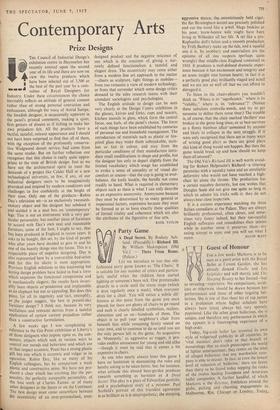Party Game
A Dead Secret. By Rodney Ack- land. (Piccadilly.)—Richard HI. By William Shakespeare. (Old Vic.) — Three From Rome. (Palace.)
LET me introduce to you that old- fashioned party game known as 'The Chairs.' It is suitable for any number of critics and particu- larly useful when the children have started ,fighting or someone's been sick. One promenades drearily in a circle until the music stops (which it does regularly once a week), when everyone dives for a chair. You will notice a subtle dif- ference at this point from the game you once played, for there are plenty of chairs to go round and each is clearly labelled symbolism, realism, alienation and so on—hundreds of them. The object is to pull your neighbour's chair from beneath him while remaining firmly seated on your own, and to continue to do so until you are the only person left in the game. As acquisitive as 'Monopoly,' as aggressive as rugger, it pro- vides endless amusement for young and old alike —though it must be said that it conies a bit expensive in chairs.
As one who nearly always loses this game I have no hesitation in denouncing the rules and hereby asking to be taken home. See, for instance, what attitude this absurd bear-garden produces towards something as harmless as A Dead Secret. This play is a piece of Edwardian pastiche, and a psychological study of a poisoner. Paul Scofield's portrait of this truculent egomaniac is as brilliant as it is unsympathetic; the stooping,
aggressive stance, the ostentatiously held cigar, the flat Birmingham accent arc precisely polished and cut the mind like a jewel. Megs Jenkins as his poor, brow-beaten wife might have been living in Willesden all her life. A set like a pre- Raphaelite doll's house and a smooth production by Frith Banbury make up the tale, and a squalid one it is. Its snobbery and materialism are the epitome of all one suspects (perhaps quite wrongly) that middle-class England contained in 1910. It produces a well-defined dramatic exper- ience because it has excitement and integrity and an acute insight into human hearts; in fact it is a perfectly good play brilliantly staged and acted and we are not so well off that we can afford to disregard it.
To listen to the chairs-players you wouldn't think so. 'Where is its "significance," where is its "validity," where is its "relevance"?' (Notice these nebulous umbrella-words, and try to get someone to define them some time.) The trouble is, of course, that the chair marked 'thrillers' was broken in the game long since, or at best survives as a flimsy bamboo affair unwanted by anyone and likely to collapse in the next struggle. If it were only recognised that there are as many ways of writing good plays as there are gciod plays this kind of thing would not happen. But then the game would break up and how should we keep them all amused?
The Old Vic's Richard III is well worth avoid- ing for Robert Helpmann's Richard—a tittering paranoiac with a squeaky voice and an unreliable deformity who would not have reached a high- chair let alone the throne. The production has a certain macabre dexterity, but one wishes that Douglas Seale did not give one quite so long in which to admire his tricks with it; they do not always bear close inspection.
It is a curious experience watching the three Italian comedians at the Palace. They are always brilliantly professional, often clever, and some- times very funny indeed, but their too-careful English suffocates and .immobilises their talents while in another sense it preserves them—try eating scampi in aspic and you will see what I


































 Previous page
Previous page